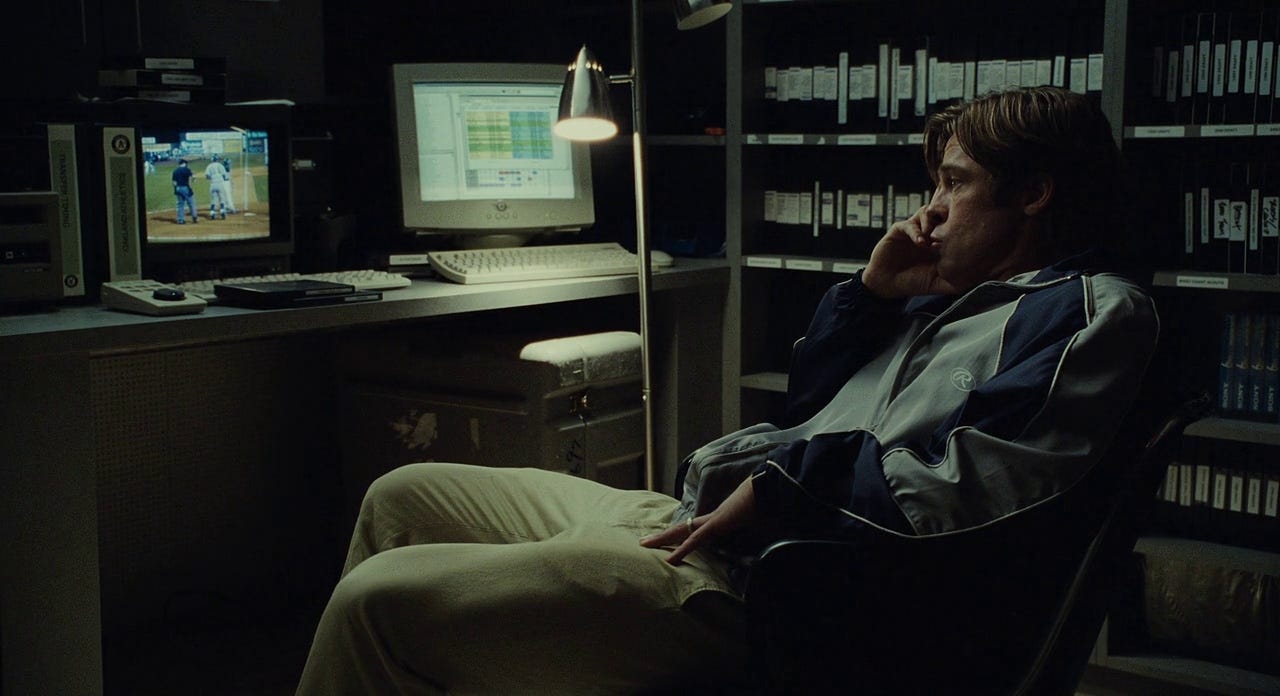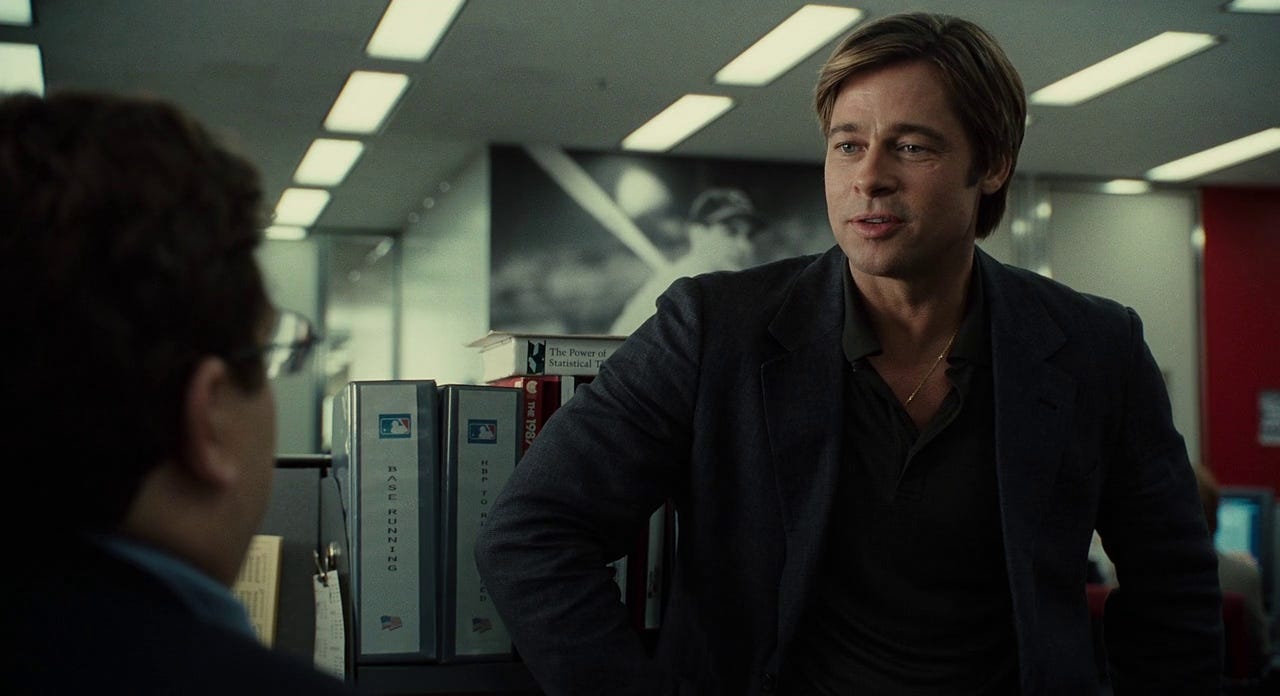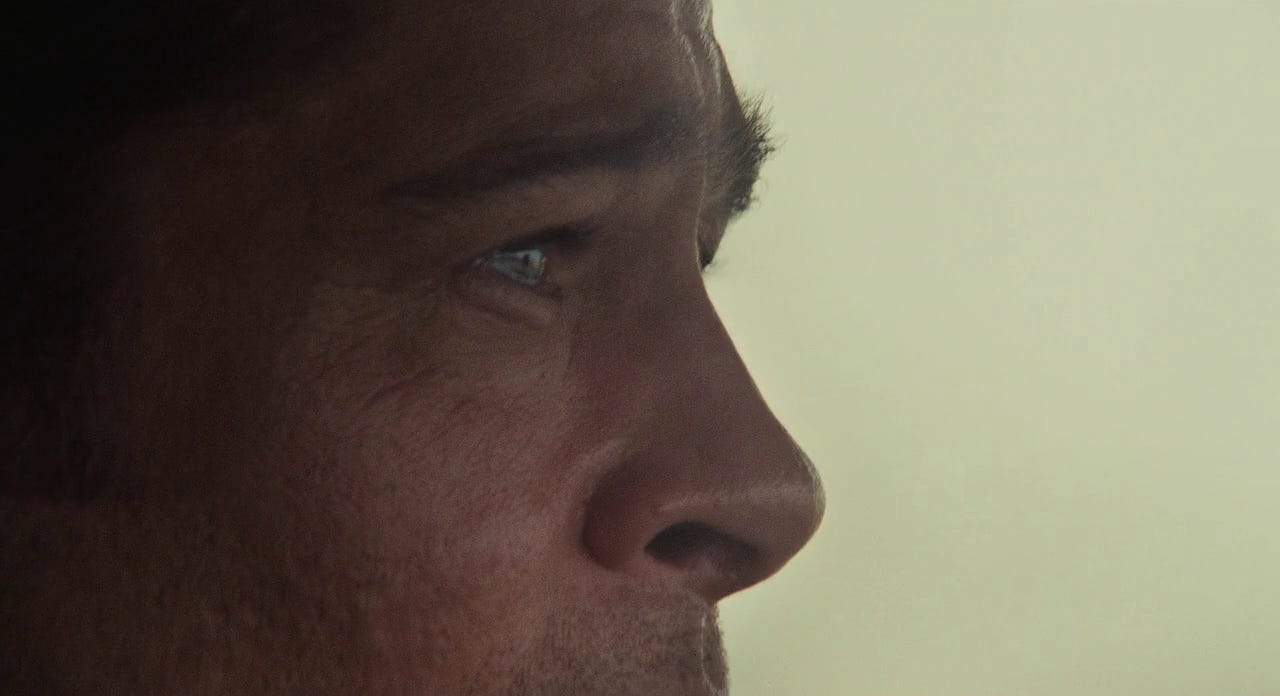Review: "Moneyball" reminds us of how films can sneak up on us over time
Movie of the Week #36
Welcome to Movie of the Week, a Wednesday column where we take a look back at a classic, obscure, or otherwise interesting movie, with writing of mine that’s never been published online before. Enjoy…
Moneyball
2011, Dir. Bennett Miller
Originally published in the book 200 Reviews, based on an unpublished piece written in May 2015.
One of the things I truly love about movies is the way a film can sneak up on us sometimes, even years after we first watched it. I saw Bennett Miller’s Moneyball back when it came out, and gave it an enthusiastic review, but like most of the 100-plus films I see in any given year, I largely put it out of my mind after that. Lately, though, for reasons I can’t quite explain, the film crawled its way back into my brain; this happens sometimes, and I always find it fascinating, the way my distant memories of a movie can climb to the forefront without warning. Whenever this happens, I inevitably have to revisit the film, and whether that prompts some sort of general disappointment, or some grand revelation, I always find the process endlessly interesting, another case-study in my endless crusade to try determining why films affect us in the many ways they do.
In the case of Moneyball, I found myself absolutely flattened by the material, and for reasons largely separate from my initial assessment four years ago. There’s a lot here on the surface that’s perfectly easy to praise: the script, by Aaron Sorkin and Steven Zaillian, is snappy and dense and expertly laid out, the performances are universally engaging, and the film’s focus on a rarely-dramatized side of baseball makes the whole thing stand out pretty powerfully from other sports dramas.
As I wrote in my initial review from 2011:
Like protagonist Billy Beane, Miller … breaks many of the established rules of his craft in order to succeed. Sports films are supposed to be about big games, startling moments of victory and inspiration;Moneyball doesn’t show any baseball at all until very late in the film. It ends on a note of melancholy, rather than triumph, and unlike most sports dramas, you won’t find any players or coaches at the center of attention. The main character is a General Manager … and his ‘sidekick’ is a Yale graduate with an Economics degree. Moneyball isn’t concerned with how baseball is played or what goes on during the game, but on the behind-the-scenes action. Most unorthodox of all, perhaps, is that Moneyball doesn’t ever glorify the sport it depicts, but is rather very critical of the shadow the ‘business’ game casts over the actual game.
All of that continues to shine, of course, but what struck me most immediately this time is just what an outstanding achievement in direction Moneyball really is. Bennett Miller earned a great deal of praise for Foxcatcher last year, and between these two films, it’s clear to me that Miller has a singular penchant for taking notable true-life tales, draining them of almost all the exterior emotional displays most filmmakers would no doubt imbue them with, and miraculously heightening the emotional, humanistic content of the story tenfold. ‘Cold’ was probably the word most commonly used to describe Foxcatcher, by myself and others, but the more I think about that film, the more I remember just how much it tied me into knots while watching, and the more I realize how firmly the film’s portrait of social isolation and ugly perfectionism have stuck with me in the months since it came out. And those are, of course, immensely powerful emotional responses, ones that linger and leave an impact so much more than the conventional, easily embraceable version of the story would.
Moneyball is painting with a broader emotional palette to begin with, of course – no matter how one approaches the subject, sports are inherently filled with a certain depth of feeling – but it still blows me away how much this same principle applies to the film. Miller works you into knots without the viewer even realizing it, and as I devoted myself to actively diving into the film this time, I was amazed to study all the ways Miller crafts such an engrossing, powerful picture while making it look more or less effortless. First and foremost is the cinematography, which may be the best thing Wally Pfister has ever done, including his many awe-inspiring collaborations with Christopher Nolan. While I wouldn’t want to take away from any of those accomplishments, there is a certain tendency in contemporary filmmaking, both in Hollywood and throughout the world, that the most outwardly ‘beautiful’ or ‘jaw-dropping’ image is automatically the ‘best.’ I myself fall prey to this line of thinking, and of course, pointing a camera at a gorgeous sunset or expensive special effect isn’t the same as capturing the beauty or awe of such a moment; a lot more work goes into it than that. But the beauty of photography is how it can transform the mundane into the profound – how the careful composition of elements within an image, the framing and spatial relations of that image, and, in cinema, the relationship between that image and those around it, can be immensely, indescribably powerful.
Moneyball is a film that lives and breathes this principle in every frame. It transforms the dingy interior of the Oakland Athletics’ third-rate clubhouse into the space of high personal drama, turns the front seat of Billy Beane’s car into a powerfully felt liminal space, and appreciates the baseball diamond not for its overall symmetrical allure, but for the way it seems at once daunting and full of possibilities to the individual, ground-level perspective. The film’s dialogue is so enticing that, upon release, I think many critics understandably deemed Moneyball more an achievement of writing than one of direction, but I look at that glorious, endlessly powerful stream of images now, and at the unconventionally rhythmic, syncopated way in which they are arranged, and I have to conclude that this is Bennett Miller’s movie, through and through. Nobody else, on film or in television, has ever taken an Aaron Sorkin script and made it feel so human, so full of life and with so much room to breathe, and so while those may be Sorkin’s words coming out of the actors’ mouths, the actual experience of watching and absorbing the movie feels like it stems from a very different author entirely.
Just look at the way Miller approaches performance. Brad Pitt is one of the most prolific and talented actors alive today, and yet the work Miller coaxed out of him here is a little unlike anything else the man has ever done. It’s an immensely mannered performance, but only when one takes a step back and thinks about it, and realizes how many little individual tics – the compulsive use of the spit cup, the forceful little pauses he injects into conversations, the way he stares down people without any particular malice – contribute to the general sense of character. It’s an incredibly detailed performance, as Pitt is wont to deliver, and where Miller makes a breakthrough, I think, is not only in encouraging that, but also in allowing for so many breathing moments throughout, moments where Miller just rests with the physicality of Beane’s performance before or after the major action of a scene is done. Miller does this with everyone in the film – Jonah Hill, Phillip Seymour Hoffman, and even Kerris Dorsey, the young woman who plays Beane’s preteen daughter – allowing each of them a great deal of time to simply let things linger, to let them ‘live out’ the various details of their performances. Sometimes, in the case of Hill or Hoffman, those details can be as simple as getting stuck thinking through a problem, or staring blankly in resigned anger and confusion – and yet, such moments make all the difference in the world.
Miller’s characters, both here and, of course, in Foxcatcher (where he took these qualities to a whole other level), feel like ‘real’ people, as much as characters in a film possibly can, and so much of the emotional power of watching this movie comes in simply spending time with such recognizable human beings. ‘Realism’ is one of the trickiest, most elusive concepts in both filmmaking and film criticism, and when I sense something that feels utterly genuine to me in a film, no matter where it comes from, it honestly blows me away. Film is such an immensely artificial medium that glimpses of recognizable human reality can feel like a bit of a magic trick. The brilliance of a director like Miller is that, in his own quiet, precise way, he invokes such a sensation without ever drawing attention to that magic – and it only makes me enamored with a film like Moneyball all the more powerfully.
In my initial review of the film, I mentioned a ‘protracted ending’ as one of my only notable complaints. And indeed, the film climaxes about twenty minutes before the credits roll, and then pushes further than ever before in its patterns of stylistic subtraction and narrative elision, essentially turning into a tone poem of sorts for the final stretch (another reason Moneyball feels less a product of the narratively confrontational Sorkin, and more the result of Miller’s quiet, unassuming precision). It’s not an easy ending, never really hitting any of the obvious beats one might think this story demands, and I understand why I felt I sense of restlessness watching this material unfold four years ago.
Now, however, I watch those last twenty minutes or so, and I simply flattened. Steamrolled. As the Athletics fail to go all the way, and Billy’s cynicism about the precariousness of his position turns out to be true – even a record 20-game winning streak isn’t enough to rock the establishment the way Billy would like – the film more or less lingers with his reaction to the loss until the credits roll, reveling in the confliction that has lived inside this man throughout the action of the film. And in pushing that confliction towards the surface, and allowing this emotional confusion to overwhelm things, Miller quietly, effortlessly reveals Moneyball to have never been much about baseball at all. This is an existential drama, first and foremost, about a man who has spent his entire life dealing with professional disappointment, and who has been softly being himself up for it every step of the way. Billy thinks the only way he can ever feel healed, from both his early major league failures and current managerial disappointments, is if the world validates his accomplishments. There is a terrific image, viewed through hazy security camera footage, where Beane goes and lays out on the field at night, alone, and we see just how small he feels, how clearly he is stuck between the enormity of his accomplishments, and the narrow way in which the world – and, perhaps more importantly, he himself – views them.
Smart and powerful images like this dominate the film’s final minutes, and combined with the brilliance of Pitt’s performance, the ending slowly grows to become about Beane having this little moment of emotional release. In the final scene, he drives towards an unknown location – again framed in tight, expressive close-ups, as if nothing else but the simple act of driving matters to him in that moment – and listens to a recording of his daughter singing for him, with lyrics – “I’m just a little bit caught in the middle” – that help make the liminality of his emotional being obvious. He begins to cry, and unable to help myself, I do too.
It’s not just Miller tying every one of the film’s themes together in this profoundly simple moment – it’s Beane himself finally, wordlessly coming to this realization that, for him, the journey is indeed more important than the destination. That the trial and error of life, represented for him in baseball, is what gives his life meaning, and that the ability to keep moving forward and rallying in the midst of struggle, more than the external validations of pennants and media praise, is what keeps him going. Maybe this isn’t the way he wants to live – maybe he’d like to take that record-breaking contract the Red Sox just offered him, and all the professional resources that would come along with it; or maybe he would like to simply step away altogether, and find a less stressful way of living. But this is who he is. The eternal uphill climb the Athletics represent is what he will always be drawn towards. And in that beautiful closing moment, I see Beane accepting this part of himself, even if the emotional release isn’t a completely conscious one. That sort of moment, of self-realization and, more importantly, of self-acceptance, is what the entire film is about, and it is applicable to the human condition in so many ways, in so many contexts beyond the reach of baseball. Miller not only builds to it expertly, but arrives at it in one of the most powerfully evocative moments of ‘emotional release’ I’ve seen in a major American film in years. By the time Miller zooms in for that final close up on Pitt’s tear-stained eyes, I feel it – I feel that sense of transcendence I feel with the greatest movies, where I sense some small but crucial breakthrough in my literal and emotional understanding of the human condition through the simple act of watching a film. And in moments like that, my faith in the power of cinema is renewed.
That’s why I’m writing this, after all. Many years into writing about cinema, I find my drive to discuss cinema challenged and lessened all the time, in a variety of ways – and when moments or films like this inspire me to write, to try making sense of the emotional experience of film through words, I take note of that, because it is an amazing and fascinating sensation. Re-watching Moneyball, I am not only convinced it is one of the stealth masterworks of this decade so far, but find myself reminded of how a film can sneak up on us when we least expect it. Which, of course, is why I started doing this in the first place. I hope this isn’t a lesson I forget any time soon.
Read the book 200 Reviews by Jonathan R. Lack in Paperback or on Kindle
Subscribe to PURELY ACADEMIC, our monthly variety podcast about movies, video games, TV, and more
Like anime? Listen to the podcast I host with Sean Chapman, JAPANIMATION STATION, where we review all sorts of anime every week. Watch on YouTube or Subscribe wherever you get your podcasts.





